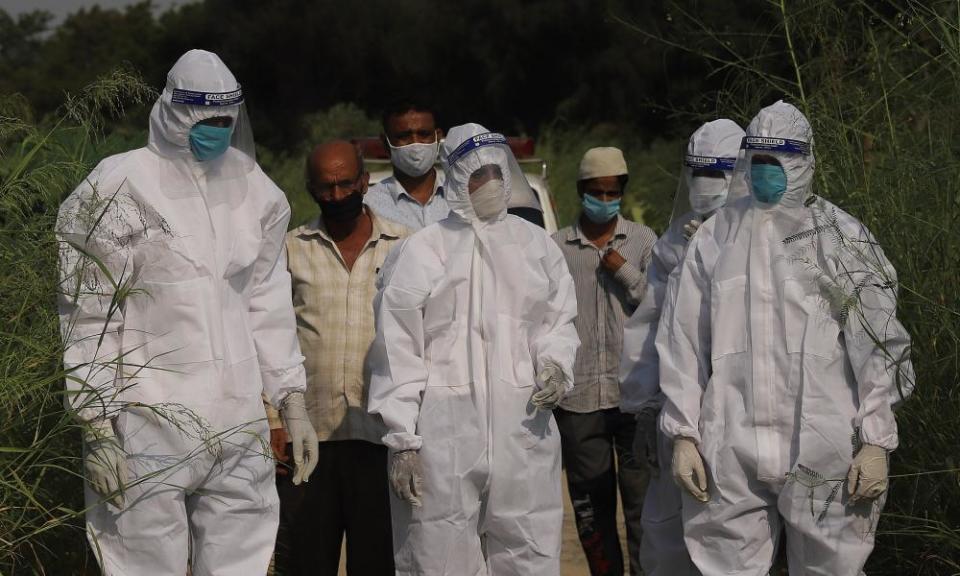The global scale of the coronavirus disaster demands a global response

The scale of the coronavirus crisis is hard to fully comprehend: globally, more than 30 million people have contracted the virus and nearly 1 million have died. The UN estimates that the pandemic will mean $8.5tn in lost output for the world this year and next. The wider social and economic costs – from poverty to mental illness to domestic violence – are almost impossible to quantify.
Yet the global scale of the disaster has not been met with a global response of the same magnitude. National governments have taken often drastic action to slow the spread of the disease. But while scientists working on diagnostics, therapies and vaccines cooperate across borders, the intergovernmental response has been marked by its absence. It also reflects the peculiarly inept and lamentable crop of global leaders from Washington to London, Moscow and Beijing.
The world should have been better prepared for a pandemic. From the Sars outbreak of 2003 to the Mers outbreak of 2012, it was apparent that coronaviruses could not only could make successful species jumps, but that they would result in human-to-human transmission – and that these novel viruses could prove deadly. The chaotic response to the Ebola outbreak in west Africa in 2014 showed just how poorly prepared the world was to tackle known, let alone novel, pathogens.
Before the second world war had been won, allied governments gathered at the Bretton Woods conference to design the institutional framework that would govern the world economy in the aftermath. It is now plain that we need a Bretton Woods for global health security. The threat to global health security from novel viruses is obvious.
The current architecture is not fit to prevent a future pandemic. The World Health Organization has recorded its latest failure: bedevilled by bureaucracy and chronically underfunded, it has been reduced to yet another arena for the diplomatic contest between the United States and a rising China. Its response to Covid-19 was too slow, and was inhibited by a reluctance to be seen to be “taking sides”.
But in truth, the WHO has never possessed either the capacity or capability to tackle a global pandemic, even if it had acted more decisively. More guidance issued more quickly would have been helpful – especially to those nations with weak health systems – but would not have fundamentally altered the trajectory of the global pandemic. Reforming the WHO is necessary but insufficient.
We now need a global foundation for health security – an institution whose purpose is to monitor threats and take steps to counter them. A properly funded global institution would invest in scientific research around the world and create the platforms needed to rapidly invent new vaccines. It would coordinate the efforts in universities and other research institutions, working alongside national governments.
It would also need to ensure sufficient vaccine manufacturing capacity to meet rapid global demand in the case of a pandemic, some of which might be redundant the rest of the time. Between them, the world’s nuclear-armed states spend $73bn annually on maintaining weapons they say they will never use. Making a permanent investment in the capacity and capability to save the world from a novel virus would be a fraction of the cost for a far more noble purpose.
There is, of course, always a danger in fighting the last war not the next one. One of the biggest threats to health security comes not from novel diseases but from current treatments losing their effectiveness. A calamitous combination of antibiotic misuse (both in humans and animals) and the failure to invest in the discovery of new antibiotics could mean that now treatable infections become deadly. A new global health security institution could lead efforts to combat antimicrobial resistance through research and changes to prescribing behaviour.
There are reasons to be hopeful. The turn of the millennium saw new resolve to tackle some of the biggest treatable and preventable diseases through new, focused, partnership-based institutions. In 2000, Gavi, the global vaccine alliance, was established and two years later the Global Fund to Fight Aids, TB and Malaria was created. These multilateral financing institutions have had a dramatic impact on global public health, between them saving more than 50 million lives. We now need the resolve to create a foundation for global health security for the good of all.
• Tom Kibasi is a writer and researcher on politics and economics

 Yahoo News
Yahoo News 